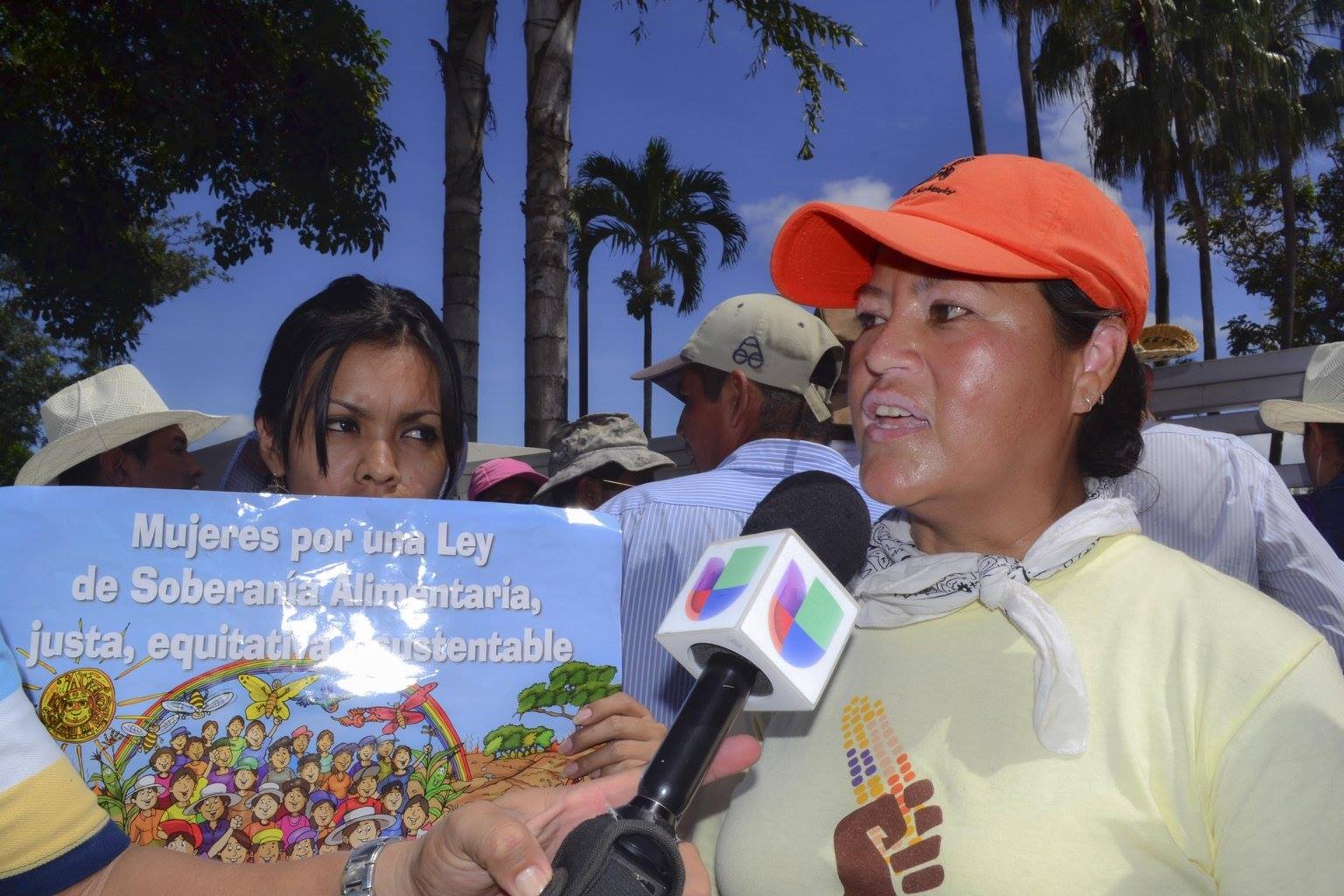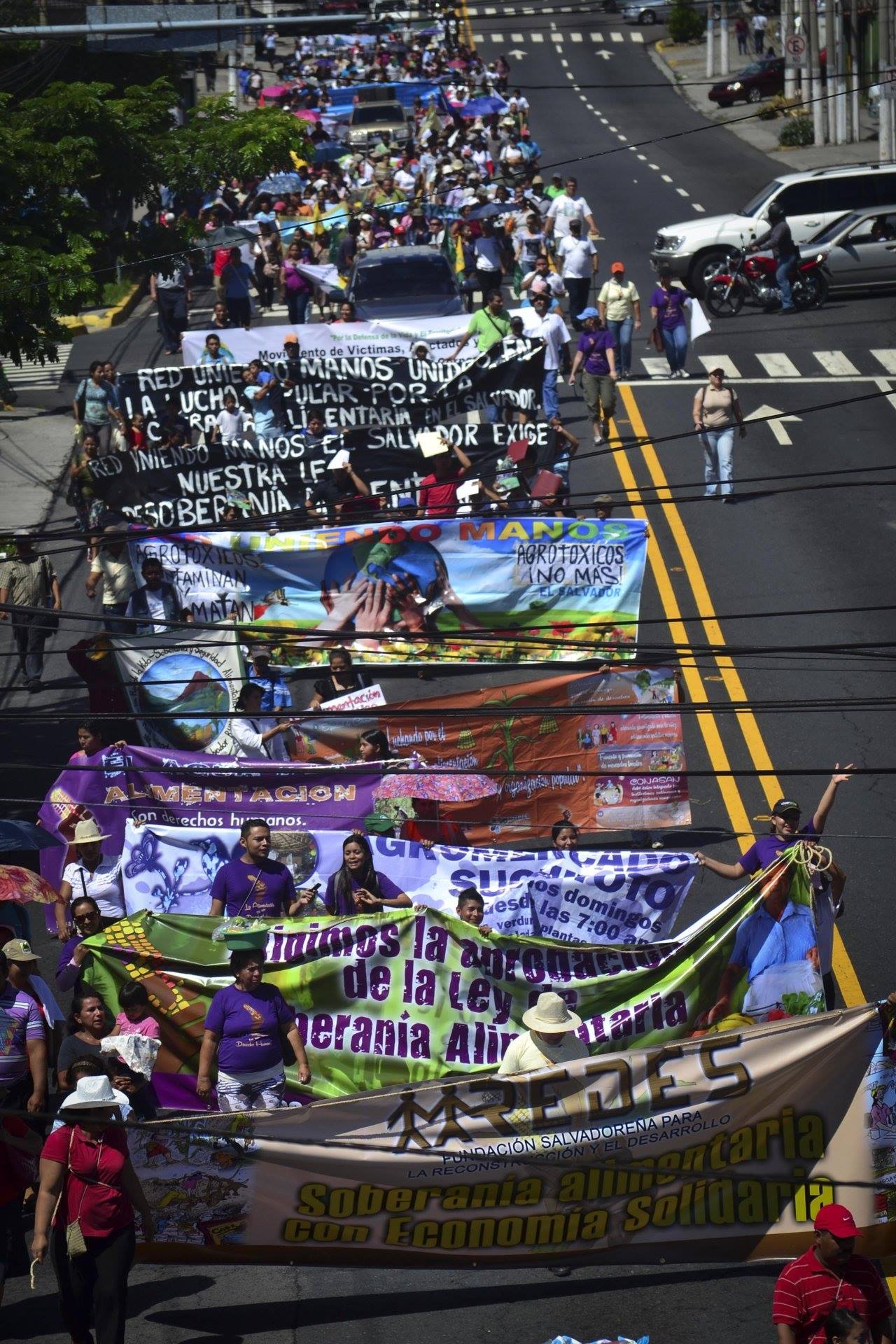Kristi Van Nostran, Companionship Facilitator, RUMES, JH El Salvador – Adapted from an article by Carlos Cotto, Executive Director of Fundación Redes, a key ally of the Joining Hands Network in El Salvador RUMES

Doris Evangelista, National Coordinator of RUMES being interviewed as a spokesperson for the National Roundtable on Food Sovereignty. Photos courtesy of Kristi Van Nostran.
On World Food day, thousands of people belonging to various farmers’ organizations and agricultural cooperatives, community and environmentalist organizations, rural women’s organizations, agro-ecology movements, solidarity economy networks, consumers, research institutions and non-governmental organizations – including more than fifty member of the Joining Hands network Red Uniendo Manos El Salvador (RUMES) – took to the streets of San Salvador to voice their demand for food sovereignty in El Salvador. This historic action, coordinated in part by RUMES, marks a significant and transcendent political achievement for at least three reasons. First, this huge popular movement made it clear that food sovereignty is now a matter of public discussion; second, it has set an important precedent of unity in the people’s movement around the food sovereignty agenda; and lastly, this symbolic day, also referred to as the Global Day of Action for a Peoples’ Food Sovereignty, was used to present the bill on Food Sovereignty, Security and Nutrition to the President of the Legislative Assembly and the Agricultural Commission for its swift approval and implementation.
The first bill of this kind was introduced over seven years ago by grassroots and cooperative farmers’ organizations. Since then, 10 more drafts have been presented to the Legislative Assembly’s Agricultural Commission. With so many bills in front of them, the Agricultural Commission agreed to establish a technical committee, which included participation of public institutions as well as social organizations, charged with the creation of one bill that would bring together the contributions of the different sectors of the Salvadoran society. The synthesis that came out of this eight-month process of long hours and difficult discussion is a bill that aims to “establish a regulatory framework to ensure food sovereignty and the full exercise of the human right to adequate food, for which mechanisms are created to support domestic production, commercialization, supply and access to food, to preserve the health and nutrition of the Salvadoran people.”
Thousands march on World Food Day in favor of food sovereignty in El Salvador.
RUMES National Coordinator, Doris Evangelista, has been highly involved through the long hours and difficult discussions of the drafting process over the last year. She has regularly been sought out by local media to offer Joining Hands’ position and to speak on behalf of the National Roundtable for Food Sovereignty in favor of the bill. Upon arriving outside the hotel where the President of the Legislative Assembly and the Agricultural Commission were meeting on World Food Day, out of the sea of thousands chanting for the approval of “the people’s Food Sovereignty Law,” Doris was invited, by name, into the meeting of legislators where she and three colleagues representing the National Roundtable for Food Sovereignty personally delivered the draft bill.
A significant amount of work went into reaching consensus and promoting a shared position among the varied networks of grassroots organizations. However, it was not just the discussion around the conference room table that guided this diverse group to a common vision. It was the time spent, the stories shared and the bread broken around dining tables that truly began to unite peers and colleagues as partners and friends to speak out with one voice, as a driving force for structural changes in the national food system. We continue to be reminded through this journey together that change is not just about law proposals and coherent public policy, but is principally about the daily practices of women and men – food producers, distributors, consumers – which offer alternatives to the global industrial food system.
The people’s organizations that marched for food sovereignty on World Food Day showed their willingness to join as partners to voice their common desire to achieve greater sovereignty over their food system. People came together to demand the strengthening of domestic food production through smallholder and family farming, with emphasis on gender equity. RUMES members and allies called out, with their banners, their T-shirts, and their voices, for the right to land and water for those who cultivate our food; for the promotion of agro-ecology and solidarity economies. Women and children demonstrated for the creation of local food markets and the rescue and protection of native seeds. Men, young and old, campaigned for methods of adaptation to the impacts of climate change and prevention against the risk of famine. From all corners of the country, people came to exercise their right to call upon their elected leaders to approve legislation that would ensure the right to adequate food for every Salvadoran.
October 16, 2013 marks a before-and-after in the history of the united people’s movement for food sovereignty in El Salvador, and signals the beginning of a new chapter in the struggle.
![]() You may freely reuse and distribute this article in its entirety for non-commercial purposes in any medium. Please include author attribution, photography credits, and a link to the original article. This work is licensed under a Creative Commons Attribution-NonCommercial-NoDeratives 4.0 International License.
You may freely reuse and distribute this article in its entirety for non-commercial purposes in any medium. Please include author attribution, photography credits, and a link to the original article. This work is licensed under a Creative Commons Attribution-NonCommercial-NoDeratives 4.0 International License.